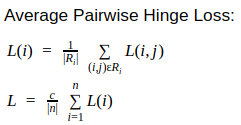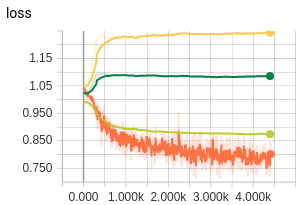-
Notifications
You must be signed in to change notification settings - Fork 129
Description
Dear @taolei87 ,
As part of my thesis project I have replicated your work in question retrieval using Tensorflow.
In your code you provide the loss for the training, as well as the performance for the dev set, but no loss for the dev set.
I have tried the following function:
def devloss0(labels, scores):
per_query_loss = []
for query_labels, query_scores in zip(labels, scores):
pos_scores = [score for label, score in zip(query_labels, query_scores) if label == 1]
neg_scores = [score for label, score in zip(query_labels, query_scores) if label == 0]
if len(pos_scores) == 0 or len(neg_scores) == 0:
continue
pos_scores = np.array(pos_scores)
neg_scores = np.repeat(np.array(neg_scores).reshape([1, -1]), pos_scores.shape[0], 0)
neg_scores = np.max(neg_scores, 1)
diff = neg_scores - pos_scores + 1.
diff = (diff > 0)*diff
per_query_loss.append(np.mean(diff))
return np.mean(np.array(per_query_loss))
but it seems to get increased after few batches, while the dev performance keeps increasing.
Only using the soft loss function that accounts for each pair loss i.e.

def devloss2(labels, scores):
query_losses = []
for query_labels, query_scores in zip(labels, scores):
pos_scores = [score for label, score in zip(query_labels, query_scores) if label == 1]
neg_scores = [score for label, score in zip(query_labels, query_scores) if label == 0]
if len(pos_scores) == 0 or len(neg_scores) == 0:
continue
pos_scores = np.array(pos_scores).reshape([-1, 1])
neg_scores = np.repeat(np.array(neg_scores).reshape([1, -1]), pos_scores.shape[0], 0)
diff = neg_scores - pos_scores + 1.
diff = (diff > 0).astype(np.float32)*diff
query_losses.append(np.mean(diff))
return np.mean(np.array(query_losses))
# example input to the functions:
# labels = [np.array([1,1,0,0,1,0,0,0]), np.array([1,1,0,0,1,0,0,0])]
# scores = [np.array([0.9,0.8,0.7,0.6,0.5,0.4,0.3,0.2]), np.array([0.9,0.8,0.7,0.6,0.5,0.4,0.3,0.2])]
does decrease the dev loss.
Do you know what's going on here? I suppose the model does not overfit, but is something that has to do with the data?
Results training a GRU model (devloss0 and devloss2 are called inside this function )
(showing MAP, MRR, P@1, P@5)

(showing devloss0 in green, devloss2 in light green and train loss in orange)
+-------+------+---------+---------+---------+---------+---------+---------+---------+---------+
| Epoch | Step | dev MAP | dev MRR | dev P@1 | dev P@5 | tst MAP | tst MRR | tst P@1 | tst P@5 |
+-------+------+---------+---------+---------+---------+---------+---------+---------+---------+
| 0 | 1 | 48.869 | 62.072 | 48.677 | 39.259 | 47.989 | 59.916 | 43.011 | 36.882 |
| 0 | 101 | 52.073 | 66.782 | 54.497 | 40.635 | 50.759 | 63.231 | 47.312 | 39.032 |
| 1 | 616 | 57.113 | 67.541 | 52.91 | 46.349 | 57.33 | 70.901 | 54.839 | 43.226 |
| 2 | 731 | 56.988 | 69.193 | 56.614 | 46.667 | 57.975 | 72.129 | 57.527 | 43.871 |
| 2 | 931 | 58.394 | 70.026 | 56.614 | 47.407 | 58.874 | 72.642 | 59.14 | 44.194 |
| 3 | 1046 | 58.385 | 70.601 | 58.201 | 46.878 | 59.244 | 74.14 | 61.29 | 44.194 |
| 4 | 1261 | 59.195 | 71.692 | 58.201 | 47.513 | 58.857 | 73.435 | 59.677 | 44.086 |
| 4 | 1361 | 58.408 | 71.76 | 58.201 | 47.831 | 58.423 | 71.093 | 55.914 | 44.086 |
| 5 | 1576 | 59.333 | 72.075 | 58.73 | 47.513 | 58.63 | 72.592 | 59.14 | 44.731 |
+-------+------+---------+---------+---------+---------+---------+---------+---------+---------+
